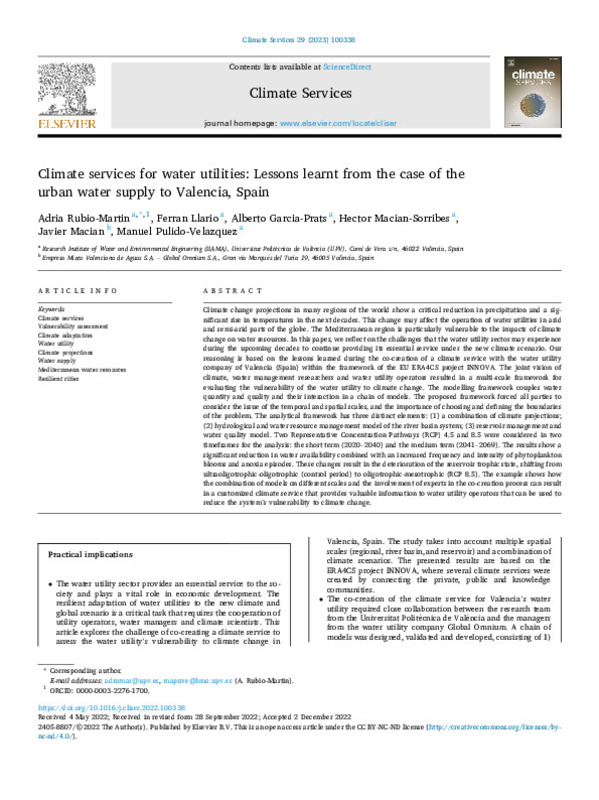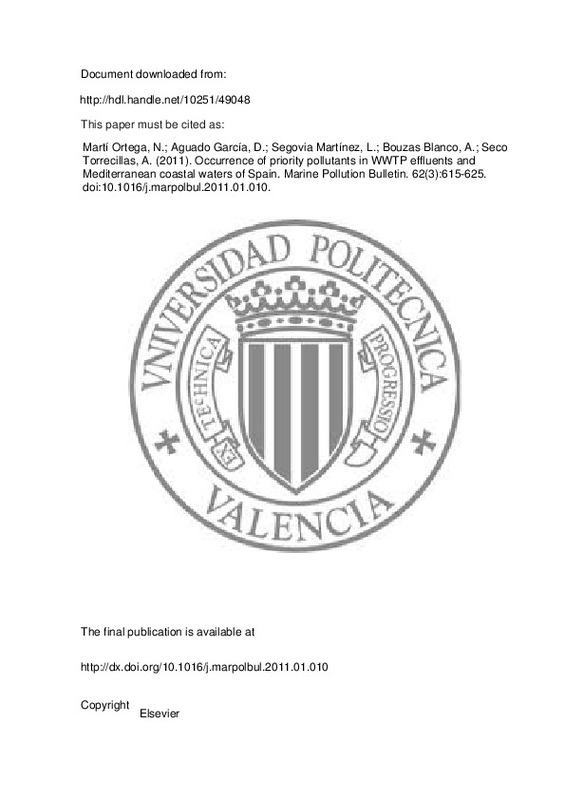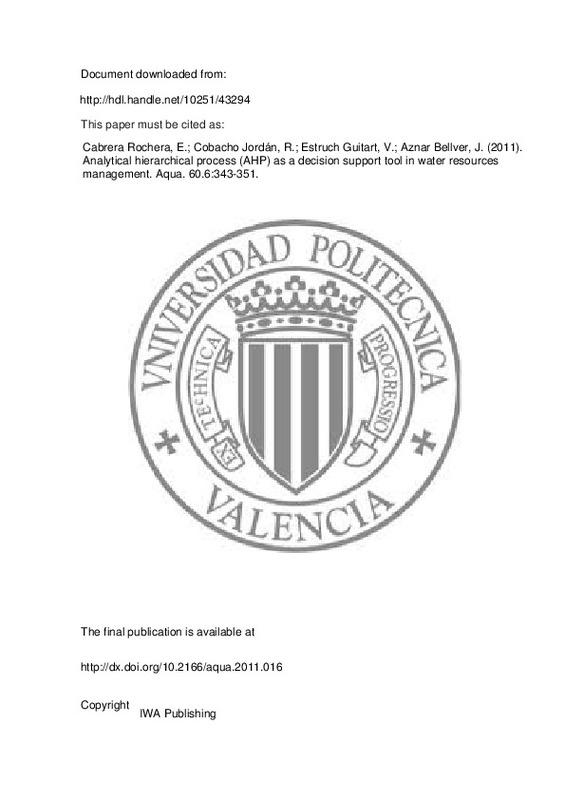Rubio-Martín, A.; Llario, F.; Macian-Sorribes, H.; Pulido-Velazquez, M.; Garcia-Prats, A.; Macián Cervera, VJ. (2023). Climate services for water utilities: Lessons learnt from the case of the urban water supply to Valencia, Spain. Climate Services. 29:1-13. https://doi.org/10.1016/j.cliser.2022.100338
Por favor, use este identificador para citar o enlazar este ítem: http://hdl.handle.net/10251/195071
|
Título:
|
Climate services for water utilities: Lessons learnt from the case of the urban water supply to Valencia, Spain
|
|
Autor:
|

 Rubio-Martín, Adrià
Llario, Ferran
Rubio-Martín, Adrià
Llario, Ferran

 Macian-Sorribes, Hector
Macian-Sorribes, Hector

 Pulido-Velazquez, M.
Pulido-Velazquez, M.

 Garcia-Prats, Alberto
Garcia-Prats, Alberto
 Macián Cervera, Vicente Javier
Macián Cervera, Vicente Javier
|
|
Entidad UPV:
|
Universitat Politècnica de València. Instituto Universitario de Ingeniería del Agua y del Medio Ambiente - Institut Universitari d'Enginyeria de l'Aigua i Medi Ambient
Universitat Politècnica de València. Escuela Técnica Superior de Ingenieros de Caminos, Canales y Puertos - Escola Tècnica Superior d'Enginyers de Camins, Canals i Ports
Universitat Politècnica de València. Escuela Técnica Superior de Ingeniería Agronómica y del Medio Natural - Escola Tècnica Superior d'Enginyeria Agronòmica i del Medi Natural
|
|
Fecha difusión:
|
|
|
Resumen:
|
[EN] Climate change projections in many regions of the world show a critical reduction in precipitation and a significant rise in temperatures in the following decades. This change may affect the operation of water utilities ...[+]
[EN] Climate change projections in many regions of the world show a critical reduction in precipitation and a significant rise in temperatures in the following decades. This change may affect the operation of water utilities in arid and semi-arid parts of the globe. The Mediterranean region is particularly vulnerable to the impacts of climate change on water resources. In this paper, we reflect on the challenges that the water utility sector may experience during the upcoming decades to continue providing its essential service under the new climate scenario. Our reasoning is based on the lessons learned during the co-creation of a climate service with the water utility company of Valencia (Spain) within the framework of the EU ERA4CS project INNOVA. The joint vision of climate, water management researchers and water utility operators resulted in a multi-scale framework for evaluating the vulnerability of the water utility to climate change. The modelling framework couples water quantity and quality and their interaction in a chain of models. The proposed framework forced all parties to consider the issue of the temporal and spatial scales, and the importance of choosing and defining the boundaries of the problem. The analytical framework has three distinct elements: (1) a combination of climate projections; (2) hydrological and water resource management model of the river basin system; (3) reservoir management and water quality model. Two Representative Concentration Pathways (RCP) 4.5 and 8.5 were considered in two timeframes for the analysis: the short term (2020¿2040) and the medium term (2041¿2069). The results show a significant reduction in water availability combined with an increased frequency and intensity of phytoplankton blooms and anoxia episodes. These changes result in the deterioration of the reservoir trophic state, shifting from ultraoligotrophic-oligotrophic (control period) to oligotrophic-mesotrophic (RCP 8.5). The example shows how the combination of models on different scales and the involvement of experts in the co-creation process can result in a customized climate service that provides valuable information to water utility operators that can be used to reduce the system¿s vulnerability to climate change.
[-]
|
|
Palabras clave:
|
Climate services
,
Vulnerability assessment
,
Climate adaptation
,
Water utility
,
Climate projections
,
Water supply
,
Mediterranean water resources
,
Resilient cities
|
|
Derechos de uso:
|
Reconocimiento - No comercial - Sin obra derivada (by-nc-nd)
|
|
Fuente:
|
Climate Services. (eissn:
2405-8807
)
|
|
DOI:
|
10.1016/j.cliser.2022.100338
|
|
Editorial:
|
Elsevier
|
|
Versión del editor:
|
https://doi.org/10.1016/j.cliser.2022.100338
|
|
Coste APC:
|
1570 €
|
|
Código del Proyecto:
|
info:eu-repo/grantAgreement/AEI/Plan Estatal de Investigación Científica y Técnica y de Innovación (PEICTI) 2013-2016/PCIN-2017-066/ES/INNOVACION EN LA PROVISION DE SERVICIOS CLIMATICOS/
info:eu-repo/grantAgreement/AGENCIA VALENCIANA DE LA INNOVACION//INNEST%2F2021%2F276//PREDICCIÓN DE COMPUESTOS SÁPIDOS EN EL AGUA PREPOTABLE PARA LA MEJORA DE SU GESTIÓN Y ADAPTACIÓN AL CAMBIO CLIMÁTICO/
info:eu-repo/grantAgreement/AEI/Plan Estatal de Investigación Científica y Técnica y de Innovación 2017-2020/RTI2018-101483-B-I00/ES/PLANIFICACION, DISEÑO Y EVALUACION DE LA ADAPTACION DE CUENCAS MEDITERRANEAS A ESCENARIOS SOCIOECONOMICOS Y DE CAMBIO CLIMATICO/
info:eu-repo/grantAgreement/GENERALITAT VALENCIANA//PROMETEO%2F2021%2F074//INtegrated FORecasting System for Water and the Environment (WATER4CAST)/
info:eu-repo/grantAgreement/EC/H2020/690462/EU
|
|
Agradecimientos:
|
This research was supported by the INNOVA, ADAPTAMED, SAPIDES, and WATER4CAST projects. The Innovation of Climate Services (INNOVA) project is funded by the European Research Area for Climate Services Consortium (ER4CS) ...[+]
This research was supported by the INNOVA, ADAPTAMED, SAPIDES, and WATER4CAST projects. The Innovation of Climate Services (INNOVA) project is funded by the European Research Area for Climate Services Consortium (ER4CS) and the Agencia Estatal de Investigacion of the Spanish government (GA: 690462; PCIN-2017-066). The ADAP-TAMED project is funded by the Ministerio de Ciencia e Innovacion of Spain (RTI2018-101483-B-I00), including EU FEDER funds. SAPIDES (INNEST/2021/276) is funded by the Agencia Valenciana de la Innovacio (AVI). Lastly, WATER4CAST (PROMETEO/2021/074) is funded by the Generalitat Valenciana through the Conselleria de Innovacion, Universidades, Ciencia y Sociedad Digital.
[-]
|
|
Tipo:
|
Artículo
|












